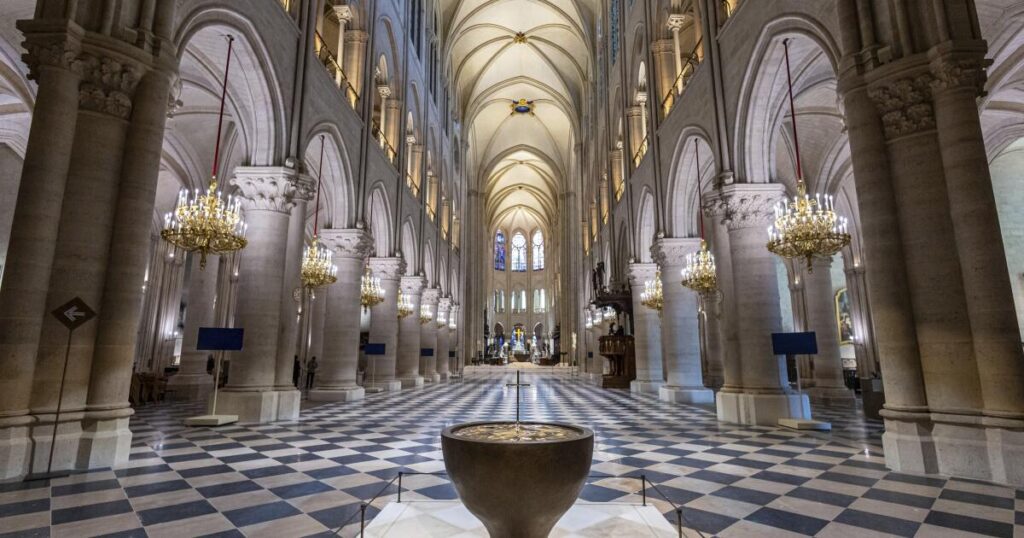PARIS — The reopening this weekend of Notre Dame de Paris is a succession of ceremonies to breathe life back into the iconic cathedral and celebrate the recovery from its devastating fire in 2019.
High points will be the ritualized reopening of the cathedral’s massive doors, the reawakening of its thunderous organ and the celebration of the first Mass. For both France and the Roman Catholic Church, the televised and tightly scripted ceremonies will be an opportunity to display resilience and global influence.
President-elect Donald Trump and dozens of heads of state and government accepted invitations from French President Emmanuel Macron. During Part 1 of Notre Dame’s rebirth Saturday evening, Archbishop Laurent Ulrich will lead more than 1,500 guests through a reopening service. Part 2, on Sunday, is an inaugural Mass, with special rites to consecrate the main altar.
Open, great doors
On Saturday, Ulrich will first reopen Notre Dame’s great doors — by tapping them with his crosier, or bishop’s staff.
The staff was created for the occasion by designer Sylvain Dubuisson. Its wood — bearing visible black traces from the blaze — came from pieces of the cathedral roof that collapsed in the inferno, Dubuisson said.
In response to the archbishop’s door-knocks, the cathedral will erupt into song, its choirs once again filling the cavernous spaces. That back-and-forth will happen three times. The doors will then open so guests can stream inside past their sculptures of biblical figures.
Reawakening the organ pipes
The voice of Notre Dame’s great organ hasn’t been heard in public since the blaze coated the nearly 8,000 pipes with toxic dust released when the lead roofing burned.
After the door-opening rites, Ulrich will reawaken the giant instrument. He’ll address it directly with a series of eight incantations, starting with “Awaken, organ, sacred instrument: Sing the praise of God.”
That prompt will launch a conversation, with four organists taking turns playing the instrument’s responses. They’ll be perched high above the congregation, seated at the newly renovated giant console that controls the instrument — through five keyboards of 56 notes each, foot pedals for 30 notes, and 115 stops.
Olivier Latry says he and the other organists will improvise their responses to the archbishop’s prompts — depending on their own and the congregation’s mood. The deepest of the organ’s 7,952 pipes are as large as a human torso, producing a low rumbling sound. The smallest are no larger than a pen.
Billionaires and poor Parisians among guests
Some 340,000 people from more than 150 countries donated $364 million for the restoration of the nearly 900-year-old cathedral, the public body in charge of Notre Dame’s restoration says.
“It’s something which belongs to everybody,” fundraising committee member Michel Picaud told AP. The nonprofit he leads, Friends of Notre-Dame de Paris, raised $57 million from 50,000 international donors, most of them Americans.
At the reopening, billionaire donors from France and beyond will rub shoulders with other guests far less fortunate. Those in attendance will include “the poorest among Parisians, all those who are helped by charitable associations and who will be several hundred inside the cathedral,” said the Rev. Olivier Ribadeau Dumas, Notre Dame’s rector.
Primped for the occasion
Although construction work continues outside, the restored interiors look more magnificent than they have for generations.
The limestone walls are creamy and luminous, cleaned of years of accumulated grime. Vaulted ceilings that collapsed have been repaired. The archbishop and other members have new garments, from a designer who has also dressed Beyoncé, Rihanna and others. The cathedral also has new furniture, including a new altar to replace one crushed when the flaming spire collapsed.
The rector says that “no one alive has seen the cathedral” as it looks now.
“The blondness of the stone, the brilliance of the paintings, the light through the stained-glass windows, all the artworks, all the paintings that were cleaned, the statues that were restored,” he said.
“All of that did not exist before the fire.”
Leicester writes for the Associated Press. AP journalists Thomas Adamson and Alex Turnbull contributed to this report.
